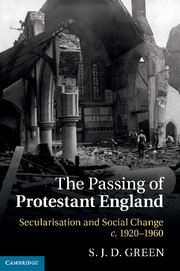Book contents
- Frontmatter
- Contents
- Acknowledgements
- Part I Outline of the problem
- Part II Disclosures of decline
- Part III Resistance, revival and resignation
- 6 The 1944 Education Act: a church–state perspective
- 7 Was there an English religious revival in the 1950s?
- 8 Slouching towards a secular society: expert analysis and lay opinion in the early 1960s
- Conclusion: the passing of protestant England
- Index
8 - Slouching towards a secular society: expert analysis and lay opinion in the early 1960s
Published online by Cambridge University Press: 10 January 2011
- Frontmatter
- Contents
- Acknowledgements
- Part I Outline of the problem
- Part II Disclosures of decline
- Part III Resistance, revival and resignation
- 6 The 1944 Education Act: a church–state perspective
- 7 Was there an English religious revival in the 1950s?
- 8 Slouching towards a secular society: expert analysis and lay opinion in the early 1960s
- Conclusion: the passing of protestant England
- Index
Summary
‘That is Bill the Bible-Puncher. Here [for] a load out there that wants saving.’ So a gently ironic docker greeted Dr Billy Graham on his arrival at Southampton in May 1966. The great preacher himself had just reached the United Kingdom at the outset of what he proclaimed would be his ‘biggest [ever] crusade’ to Britain, planned for the summer of that year. Many of the natives might have had other things on their minds during the fateful weeks which followed. This was, after all, the moment of that World Cup. Still, Graham never doubted that his task assumed the proportions of a truly urgent mission. He had plenty of reasons for concern at the time. Since his last visit, some twelve years earlier, ‘the church had fallen behind’ on these islands. As a result, a metaphysical ‘ocean’ of ‘hate, lust, jealousy, and tragedy’ now ‘stretched landward’ from England's south coast, ‘almost as far as the eye could see’. In such worsening circumstances, the ‘fuller face[d]’ and ‘slightly grey[ed]’ proponent of ‘Bible Rock’ publicly pledged a new and ‘massive effort’ to give Britain the ‘spiritual facelift’ it so desperately needed. God was not going to go down in this ancient protestant realm without a fight.
By no means all the locals proved entirely grateful recipients of this kind of attention. Preaching in the learned city of Oxford, a few days after coming to England, Graham was rudely ‘heckled’ by militant members of the University Humanist Group.
- Type
- Chapter
- Information
- The Passing of Protestant EnglandSecularisation and Social Change, c.1920–1960, pp. 273 - 302Publisher: Cambridge University PressPrint publication year: 2010



